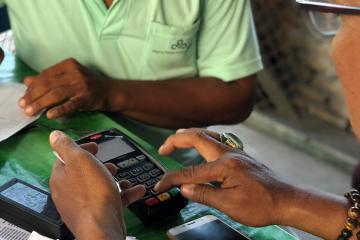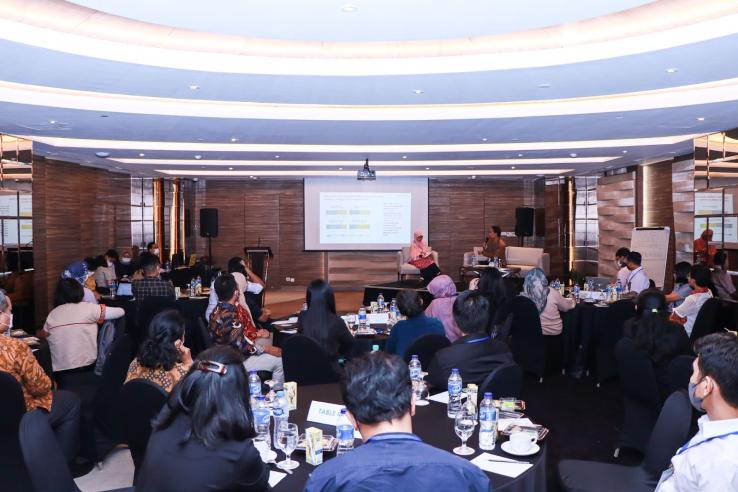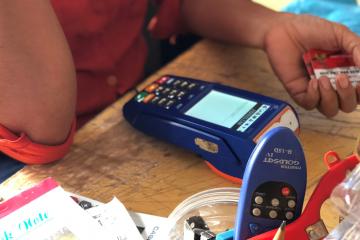
Accelerating financial inclusion in Indonesia through innovations in digital financial services: Early learnings from exploratory and pilot studies

Access to digital financial services (DFS) can help drive economic development by providing new, accessible digital tools and opportunities for the unbanked and newly banked. To increase DFS adoption, the Inclusive Financial Innovation Initiative (IFII) at J-PAL Southeast Asia (SEA) has supported exploratory and pilot studies led by researchers from the J-PAL network to generate evidence in high-priority areas. Through these studies, our goal is to maximize the potential benefits of DFS for economic development.
Such exploratory and pilot studies have aimed to explore issues in DFS adoption, such as: 1) harnessing competition to improve the quality of branchless banking services, 2) addressing barriers to the adoption of digital lending among women microcredit clients, and 3) micro, small, and medium enterprises’ (MSMEs’) low visibility on e-commerce platforms.
On 26 January 2023, IFII hosted a learning collaborative to share insights from exploratory and pilot studies to inform policy and decision-making in the digital financial inclusion space. Speakers and participants from government agencies, nonprofit organizations, and the private sector had the opportunity to discuss project findings and exchange insights on ways to increase the sustained adoption of DFS in Indonesia.
Below are the key takeaways from the learning collaborative:
1. Understanding how competition affects branchless banking agents' behavior is important for informing agent sales strategy
Branchless banking agents are an important component of accelerating financial inclusion in Indonesia. Since 2014, agents have expanded to serve people without access to banks, creating a more competitive services landscape. Competition between agents may generate benefits or create obstacles. The potential benefits are that consumers will have more choices between agents, receive better customer service, and experience less misconduct. However, competition may also make business unsustainable for the agents due to the increased competitive pressure.
Understanding how important these costs and benefits are in practice is essential for shaping banks’ agent sales strategy. To answer this, J-PAL affiliated professors Erika Deserranno and Firman Witoelar Kartaadipoetra, together with Gianmarco Leon-Ciliotta, Martin Kanz, and Daniel Gottlieb, are continuing their long-standing collaboration with a state-owned bank in Indonesia to conduct a study on how branchless banking agents respond to competition.
To understand the conditions of the branchless banking agents’ market, researchers began the study by conducting exploratory surveys of around 800 agents and 1,500 customers. Through these activities, researchers found that the majority of agents do not consider customers’ perception of them to be important, meanwhile customers value trustworthy agents. Hence, in anticipation of increased competition driven by market expansion, researchers now are designing interventions to study how informing different levels of competition affects agents' behaviors and services toward customers.
2. Increasing confidence and combating misperceived risks are key to increasing digital lending adoption among female microentrepreneurs
In Indonesia, 52.9 percent of microenterprises are run by women. DFS can potentially help businesses improve their access to financing, suppliers, and buyers. Despite the potential benefits, many women-owned businesses are still excluded from DFS. With many women being microcredit borrowers in Indonesia, there are opportunities to deepen their digital engagement and DFS adoption through loan digitization. Through a collaboration with an Indonesian microcredit institution and an e-wallet platform, J-PAL affiliate Arya Gaduh, with Arief Wibisono Lubis, conducted an exploratory study to assess such opportunities.
The exploratory study was conducted to understand women’s barriers to digital technology and DFS in order to inform potential interventions designed to enhance their adoption of digital lending. Key findings from the exploratory surveys highlighted that women have a strong motivation to utilize digital technology for their businesses. However, surveyed microentrepreneurs often lack confidence and face challenges in navigating more complex apps like e-commerce and e-wallets. These women were also found to have concerns regarding the security risks of digital technology. These insights suggest that training and mentorship may accelerate women’s use of digital lending technology. At the same time, identifying other compelling use cases of DFS among these groups of women may be important to further build their motivation and digital engagement.
Participants at the forum also discussed ways to better sustain DFS use, as microentrepreneurs frequently cash out their digital money because the transactions they need to make for their enterprises (with suppliers and consumers) are cash-based. One possible solution could be to introduce micro-entrepreneurs to the broader digital ecosystem, such as e-commerce vendors, to help lower their cost of production.
3. Signaling product quality may support MSMEs’ e-commerce success
E-commerce offers MSMEs the opportunity to access new markets and financial tools and services. However, in order for this opportunity to be realized, firms must thrive on the platform—and many struggle to do so. Thus, aside from encouraging MSMEs to enter e-commerce platforms, it is essential to ensure that they remain competitive once they are in the online marketplace.
In 2022, as many as 17.5 million MSMEs in Indonesia entered e-commerce platforms. Yet, many MSMEs have failed to generate their first sales after joining due to inadequate promotional abilities, poor product quality, and/or a lack of digital literacy skills. More broadly, small firms are often difficult to locate on platforms, and consumers may be wary of purchasing from a small supplier with a limited track record. These “search frictions” limit many promising MSMEs’ ability to thrive on platforms.
To further explore ways to enhance MSMEs’ growth in e-commerce, J-PAL affiliates Jie Bai and Jing Cai, together with Daniel Xu, Chaikal Nuryakin, and Prani Sastiono, conducted a pilot study in collaboration with a large e-commerce platform in Indonesia. The pilot aimed to understand the importance of reducing search frictions through advertisements and coupons. The idea behind this approach is to increase the visibility of MSMEs and drive demand for their products. However, preliminary findings indicated that advertising MSMEs’ products on microsites or through banners, as well as offering vouchers for price and shipping discounts, did not lead to more sales. Other factors, such as MSMEs having less competitive value propositions due to their inability to signal good product quality, may explain the minimal impact.
These initial findings suggest that more measures to signal product quality to customers may be needed to make MSMEs more competitive. There are different ways to indicate product quality, such as by applying for product certifications or improving the quality of product marketing to boost attractiveness and drive demand. Training for MSMEs can also support them in applying for certifications and in increasing the quality of their product marketing.
Finding innovative solutions to maximize DFS impact
Overall, the learning collaborative forum gave important insights to create innovative solutions in pushing the frontier of digital financial inclusion. The findings presented from exploratory and pilot studies helped generate rich learnings that are useful for policymaking and future program designs. Going forward, J-PAL SEA’s IFII will continue to support stakeholders in finding innovative solutions to advance digital financial inclusion through rigorous evaluation.
Since officially launched in 2020, J-PAL SEA’s IFII has been working towards its long-term objective of ensuring that digital financial services drive economic development while lifting up low-income households that often lack access to formal financial services. To learn more about IFII, reach out to [email protected].
